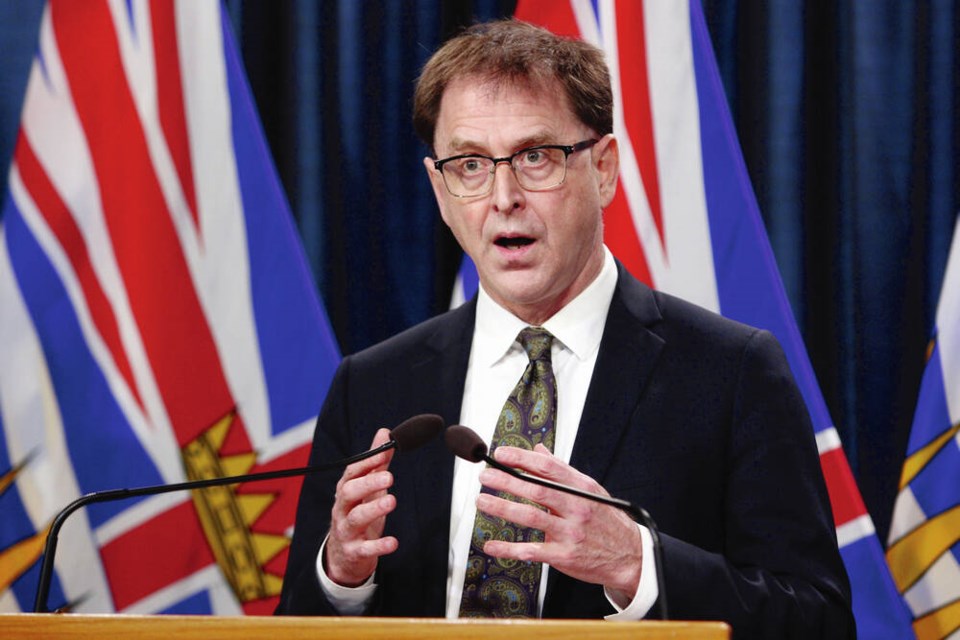Health Minister Adrian Dix unveiled a lung-cancer screening program at 36 sites around the province Wednesday, aiming to detect cancer earlier in high-risk people.
B.C. is the first province to introduce a province-wide lung-screening program, according to the Health Ministry. The annual operating cost is $2.75 million, while the start-up cost to provide specialized software to interpret the scans included $1.9 million from the B.C. Cancer Foundation and $800,000 from the Canadian Partnership Against Cancer. The lung-cancer screening program is in addition to the already established provincial breast and colon-cancer screening programs.
“It is our aspiration and our goal not to be the only one in Canada, not to be first in Canada, but for this program to go from here — with its success and its impact on patients — to every part of our country,” said Dix.
The lung cancer screening program expects to screen nearly 10,000 eligible patients in the first year — increasing by about 15 per cent a year to reach 20,000 patients in 2030 — and annually diagnose about 150 lung cancers that wouldn’t otherwise be caught.
On Vancouver Island, the screening will be done in Victoria’s two main hospitals, along with Saanich Peninsula Hospital, Cowichan District Hospital in Duncan, Nanaimo Regional General Hospital, and North Island Hospitals in Comox Valley and Campbell River, said Dix.
B.C. has the lowest rate of lung cancer in Canada.
The screening program will use existing low-dose computed tomography (CT) scans. Asked if the province has adequate staffing for the screening program, Dix said: “We do — that’s why we’re launching [today].”
With respect to concern about wait times for imaging and cancer treatment, Dix said that’s why in 2020, the province created a 10-year provincial cancer plan that included a commitment to new cancer centres in Nanaimo as well as Burnaby and Surrey.
Lung cancer is the most common cancer in Canada and worldwide, primarily affecting people age 50 and older. Tobacco use of 20 years or more is the most common cause.
Dr. Stephen Lam, medical director of the B.C. Cancer Lung Screening Program, who is leading the program’s implementation, said seven people die of lung cancer every day in B.C., “with 70 per cent of all cases diagnosed at an advanced stage.”
The lung cancer screening program aims to change that trend by detecting the majority of lung cancers at an early stage.
Dr. Kim Nguyen Chi, chief medical officer for B.C. Cancer, said earlier detection of cancer means treatment that can be “less invasive and have faster recovery and higher rates of cure.”
Eligible participants currently include those between 55 and 74 who smoke or previously smoked, or have a smoking history of 20 years or more.
The province is encouraging patients who meet the above criteria to call the Lung Screening Program at 1 877-717-5864 to complete a consultation and risk assessment to determine eligibility.
The goal is to catch the disease before symptoms appear — there are often no symptoms with early-stage lung cancer, and when symptoms do appear, they are often from the spread of the disease.
Symptoms of advanced lung cancer may include: a new, changing or worsening cough, sudden shortness of breath when walking or exercising, blood in sputum, wheezing unrelated to asthma or infection, hoarse voice, repeated cases of pneumonia or bronchitis, fever, weakness, weight loss, chest pain, difficulty swallowing and swollen lymph nodes in the neck.
One in two people will develop cancer in their lifetime, said Dix, noting that because people are living longer, the province can expect to see more age-related cancer, in particular over the next 15 years.
Warren Clarmont, provincial director of Indigenous Cancer Control at B.C. Cancer, said Indigenous people experience a higher incidence of lung cancer than other B.C. residents. He anticipates a province-wide lung-screening program will help “reduce barriers” to access for eligible First Nations, Métis and Inuit people.
ceharnett@timescolonist.com
For those who want to quit smoking, Lung Cancer Canada suggests the following resources in B.C.:
HealthLink BC - https://www.healthlinkbc.ca/health-feature/quit-smoking
Quitnow.ca - https://www.quitnow.ca/
B.C. Smoking Cessation Program - https://www2.gov.bc.ca/gov/content/health/health-drug-coverage/pharmacare-for-bc-residents/what-we-cover/bc-smoking-cessation-program



